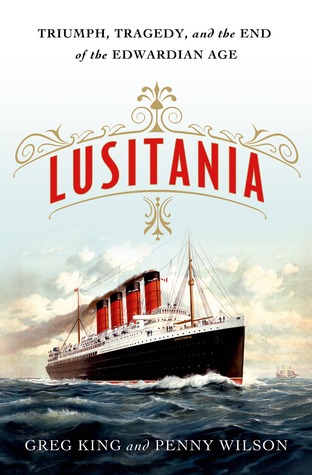
Title: Lusitania: Triumph Tragedy, and the End of the Edwardian Age
Author: Greg King and Penny Wilson. Read by Johnny Heller
Publisher: Tantor Audio, 2015. Original hardcover by St. Martins, 2015, 400 pages.
Source: Library digital collection
Publisher's Summary:
On the 100th Anniversary of its sinking, King and Wilson tell the story of the Lusitania's glamorous passengers and the torpedo that ended an era and prompted the US entry into World War I.
Lusitania: She was a ship of dreams, carrying millionaires and aristocrats, actresses and impresarios, writers and suffragettes – a microcosm of the last years of the waning Edwardian Era and the coming influences of the Twentieth Century. When she left New York on her final voyage, she sailed from the New World to the Old; yet an encounter with the machinery of the New World, in the form of a primitive German U-Boat, sent her – and her gilded passengers – to their tragic deaths and opened up a new era of indiscriminate warfare.
A hundred years after her sinking, Lusitania remains an evocative ship of mystery. Was she carrying munitions that exploded? Did Winston Churchill engineer a conspiracy that doomed the liner? Lost amid these tangled skeins is the romantic, vibrant, and finally heartrending tale of the passengers who sailed aboard her. Lives, relationships, and marriages ended in the icy waters off the Irish Sea; those who survived were left haunted and plagued with guilt. Now, authors Greg King and Penny Wilson resurrect this lost, glittering world to show the golden age of travel and illuminate the most prominent of Lusitania's passengers. Rarely was an era so glamorous; rarely was a ship so magnificent; and rarely was the human element of tragedy so quickly lost to diplomatic maneuvers and militaristic threats.
My Review:
I used the publisher's summary above to illustrate a point. Despite the blurb's opening lines (italicized by me), King and Wilson make a point in the opening chapter of the book of debunking the idea that the sinking of the Lusitania brought the US into the war. A quick look at the timeline (sunk in 1915; US entered the war in 1917) should make that point, and that's about all they gave it.
In any case: this book isn't as much concerned with the war and the political significance of things as it is with the culture and society. It's not what the sinking started that concerns King and Wilson, but what it ended: the Edwardian Age. Of course, that era of mannered society, strict class lines, and opulent elegance (for the rich) wasn't just ended by the sinking of one ship. It was ended by the war, but the ship makes a lovely metaphor.
It isn't a metaphor that King and Wilson explore very deeply, in my opinion. To me, this book was largely a joyous dive into the elegance of the ship and the era, and an exploration into a selection of lives (largely of survivors, no doubt in part because of a greater access to information). That the authors chose to focus on first class passengers, and a few from second class whom they found interesting, sent me a clear message. The book is not a very deep look at the age or the event, but it *is* a fascinating look at a number of lives and a nice illustration of the times (including, perhaps, the way in which the war was not taken quite seriously by the US at that point). That said, the look is never deep enough and the switches from one to another were far too rapid for my taste.
The audiobook:
My last comment above brings me to the main problem of the audio book, which is not entirely the fault of the narrator. With the story switching rapidly from one story-line to another, the listener (this listener, anyway) is always a step behind, without any of the visual cues a printed book gives for such changes of direction. The narrator might have done more to create hesitations, but the book switches so often and so rapidly that I think that would have created its own listening problems. In general, the narrator did a good job, but it was still sometimes hard to follow.
Summary:
This book was interesting to listen to, and I learned a fair amount about the event and the era, but I found it in many ways shallow and, as mentioned, very hard to follow as an audio book. I think there may be better books out there about the sinking of the Lusitania, and I may well hunt them down.
Full Disclosure: I checked Lusitania: Triumph, Tragedy, and the End of the Edwardian Age out of my library, and received nothing from the writer or publisher in exchange for my honest review. The opinions expressed are my own and those of no one else. I am disclosing this in accordance with the Federal Trade Commission's 16 CFR, Part 255: "Guides Concerning the Use of Endorsements and Testimonials in Advertising."
The interesting thing about this is that the class distinction in travel shifted from ships to the new glamour - passenger planes, an era of glamour that ended with WW2. But it definitely was the beginning of the end of the rampant class distinction... it's just a different type of class distinction now, and they don't do anything so vulgar as travel with us plebs. :)
ReplyDeleteGood point about glamour and early air flight. Class in England at least used to be different from here in the States. I think we have a MUCH stronger caste system than most people will admit, and it's only been exacerbated by the way money is all flowing to the top these days. The educational split is getting bigger again, too. Pretty soon we'll elect ourselves some peers and just embrace it...
Delete